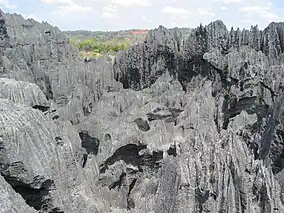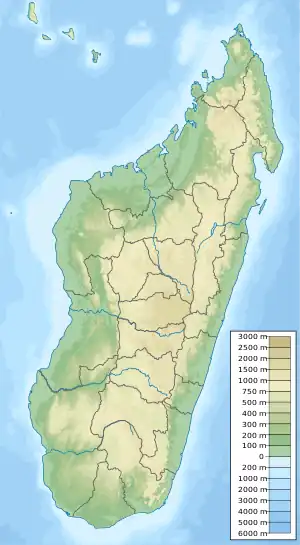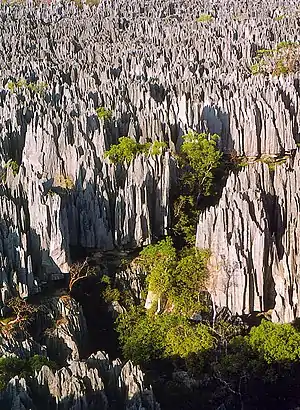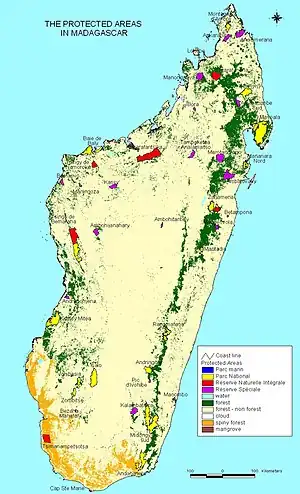| Tsingy de Bemaraha Strict Nature Reserve | |
|---|---|
 A karst limestone formation, known as tsingy in Malagasy | |
 Location of Tsingy de Bemaraha Strict Nature Reserve | |
| Location | Melaky Region, Madagascar |
| Nearest city | Antsalova |
| Coordinates | 18°40′S 44°45′E / 18.667°S 44.750°E |
| Area | 834.11 km2 (322.05 sq mi) |
| Established | 31 December 1927 |
| Governing body | Madagascar National Parks |
| Official name | Tsingy de Bemaraha Strict Nature Reserve |
| Type | Natural |
| Criteria | vii, x |
| Designated | 1990 (14th session) |
| Reference no. | 494rev |
| Region | Africa |
Tsingy de Bemaraha Strict Nature Reserve (Malagasy: Tsingin'ny Bemaraha, French: Réserve naturelle intégrale du Tsingy de Bemaraha) is a nature reserve located near the western coast of Madagascar in Melaky Region. The area was listed as a UNESCO World Heritage Site in 1990 due to the unique geography, preserved mangrove forests, and wild bird and lemur populations.[1][2]
National Park
The southern end of the protected area was changed into the Tsingy de Bemaraha National Park in 1997, while the northern end of the protected area remains as a strict nature reserve (Réserve Naturelle Intégrale). Borders were most recently adjusted in 2011.
It is characterised by needle-shaped limestone formations, above cliffs over the Manambolo River.[3] The incredibly sharp limestone formations can cut through equipment and flesh easily, which makes traversing them extremely difficult. The word "Tsingy" is derived from a local word meaning "the place where one cannot walk barefoot".

Tourism
Tourists can access the national park by road from Morondava, a town 150 km south of the park. Limited access is also possible from the town of Antsalova, which can be reached by plane from Antananarivo or Mahajanga.
See also
References
- ↑ "Tsingy de Bemaraha Strict Nature Reserve". UNESCO. Retrieved 2009-11-01.
- ↑ Shea, Neil (November 2009). "Living On a Razor's Edge: Madagascar's labyrinth of stone". National Geographic. Archived from the original on October 22, 2009. Retrieved 2009-11-01.
- ↑ "21 World Heritage Sites you have probably never heard of". Daily Telegraph.
External links
